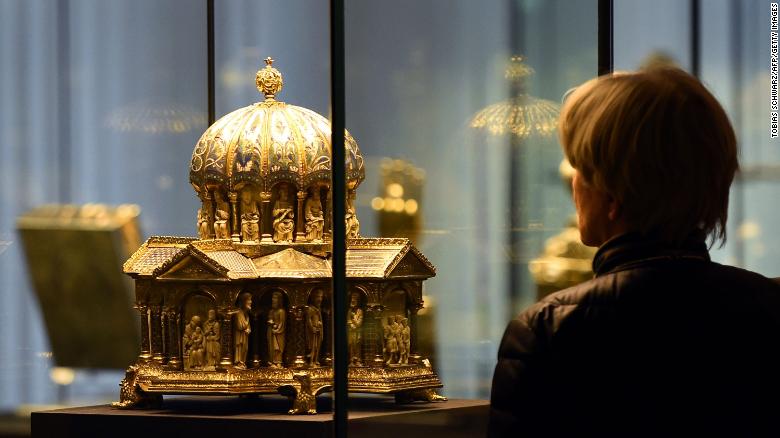Supreme Court deals setback to Holocaust victims in art disputes

A
visitor looks at the the cupola reliquary (Kuppelreliquar) of the
so-called "Welfenschatz" (Guelph Treasure) displayed at the
Kunstgewerbemuseum (Museum of Decorative Arts) in Berlin, on February
24, 2015.
Washington (CNN)The Supreme Court on Wednesday wiped away lower court decisions that had gone in favor of Holocaust victims and family members who are seeking to bring suit in US courts against Hungary and Germany for property they say was stolen from them during World War II.
The
court said lawyers for the victims had not reached the necessary bar to
prove their claim falls under an exception to a federal law that
generally provides immunity to foreign states from suit in US courts.
The justices sent the cases back to the lower courts to allow victims to
press other arguments in their favor.
In
the case concerning Germany, Chief Justice John Roberts, writing for a
unanimous court, said: "As a Nation, we would be surprised -- and might
even initiate reciprocal action -- if a court in Germany adjudicated
claims by Americans that they were entitled to hundreds of millions of
dollars because of human rights violations committed by the United
States Government years ago."
The
first case involving Hungary was initially brought in 2010 by 14 Jewish
survivors -- including four United States citizens -- who sued Hungary
and its state run railway company in US courts seeking compensation for
the property that was stolen from their families in 1941. They said
their possessions and those of their families were taken from them as
they boarded trains destined for concentration camps and they seek to
represent a class of victims who have been injured in similar ways.
The
plaintiffs said that while the Foreign Sovereign Immunities Act
generally provides immunity to foreign states from suit in US courts,
their case falls into an exception because the goods were stolen in
violation of international law. But lawyers for Hungary said that such
litigation would interfere with the foreign policy of the United States,
and that US courts have long dismissed such claims so as to avoid
"international discord."
"Adjudicating
these claims would inevitably disrupt foreign relations and could
expose the United States to similar treatment by other nations' judges,"
Gregory Silbert, a lawyer for Hungary, told the justices in court
papers. He stressed that in 1947, Hungary and the Allied Powers entered
into a peace treaty that covered property losses and that Hungary has
made "substantial, additional payments to Holocaust victims and Jewish
organizations." They said the "tens of billions of dollars" the
plaintiffs might seek would "devastate Hungary's economy."
The
US Department of Justice sided with Hungary's position. In briefs,
acting Solicitor General Jeff Wall said the US "deplores the atrocities
committed by the Nazi regime" and it has supported efforts to provide
their victims with remedies for "egregious wrongs."
But
in the case at hand, Wall said the US has "paramount interest" in
ensuring that its foreign partners handle the dispute, arguing that
litigation in US courts could "undermine that objective." He said that
courts have long recognized that in appropriate cases, judges could
voluntarily defer to another nation to resolve the dispute.
A
district court dismissed the lawsuit -- and declined to get involved --
holding that the survivors should have first tried to file suit in
Hungary. A federal appeals based in Washington, DC, reversed.
Judge
Gregory Katsas, a Trump appointee, dissented from the decision. Katsas
called the dispute a "foreign-cubed case -- involving wrongs committed
by Hungarians against Hungarians in Hungary" that should be litigated in
Hungary.
Sarah Harrington, a lawyer for the victims, says the plain language of the FSIA allows US courts to hear survivors' claims.
"Hungary
committed in the 1947 peace treaty to fully compensate its victim and
it has never done so," Harrington said in interview. "Congress said
courts could hear these claims and even the United States has said there
is a moral imperative to provide justice for Holocaust victims in their
life time."
The
second case, Germany v. Phillipp, took a closer look at the reach of
the law as it applies to the heirs of several Jewish art dealers who did
business in Germany in the 1930s. They seek to recover an art
collection of medieval relics and devotional art dated from the 11th to
the 15th century. In court papers, their heirs say they were forced to
sell the art to the Nazi-controlled State of Prussia at a price much
less than the art was worth. They lost a claim in Germany after an
advisory commission concluded that the sale of the art "was not a
compulsory sale due to persecution."
They then filed suit in US courts seeking the return of the art and -- or -- $250 million.
Nicholas
M. O'Donnell, a lawyer for the victims, said that in 1935 the "Nazis --
led by Hermann Goering and for Hitler's personal benefit -- forced the
sale of the collection at issue in this case" known as the Welfenschatz.
"If such a coerced sale is not a taking in violation of international
law, then nothing is," he said.
Germany disputed that account.
A
panel of judges on the United States Court of Appeals for the District
of Columbia Circuit held that under the FSIA, a suit could go forward.





No comments